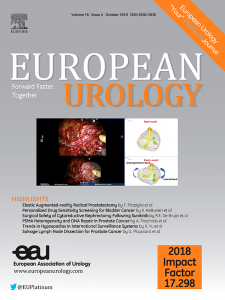Stereotactic Body Radiation Therapy Alone or in Combination with Immunotherapy in Kidney Cancer: A Systematic Review
IF 25.3
1区 医学
Q1 UROLOGY & NEPHROLOGY
引用次数: 0
Abstract
Background and objective
Despite its radioresistant reputation, renal cell carcinoma (RCC) is sensitive to high dose per fraction stereotactic ablative body radiotherapy (SABR). As SABR also triggers immunomodulatory effects, a combination of SABR and immunotherapy for RCC might improve patient outcomes. The current systematic review will discuss all prospective studies on SABR alone or combined with immunotherapy.Methods
A systematic review was conducted in January 2025 according to the Preferred Reporting Items for Systematic Reviews and Meta-analyses statement on the PubMed and Cochrane databases. Thirty-eight studies were included in this review.Key findings and limitations
In the primary setting, 15 prospective studies have proved SABR to be a valuable alternative for (partial) nephrectomy for high-risk or medically inoperable patients, with good tolerability and excellent local control. No prospective studies have reported on SABR combined with immunotherapy in nonmetastatic patients. In the oligometastatic setting, two phase 2 trials have investigated SABR in lieu of systemic treatment. This showed encouraging results, with the majority of patients being free from systemic therapy at 1 yr. SABR combined with immunotherapy in the metastatic setting has been investigated in multiple phase 1 and 2 trials, where the most promising option seems to be SABR to multiple—preferentially all—lesions. Cytoreductive SABR and SABR to oligoprogressive lesions combined with immunotherapy are attractive future strategies.Conclusions and clinical implications
SABR is a valid alternative in localised RCC when (partial) nephrectomy is not an option. In the metastatic setting, several early-phase trials have investigated SABR alone and in combination with immunotherapy, warranting future large, randomised trials.肾癌单独或联合免疫疗法的立体定向体放射治疗:系统性综述
背景和目的尽管肾细胞癌(RCC)具有抗放射的名声,但它对每分高剂量立体定向消融体放射治疗(SABR)很敏感。由于 SABR 还能引发免疫调节作用,因此将 SABR 和免疫疗法结合起来治疗 RCC 可能会改善患者的预后。本系统综述将讨论所有关于 SABR 单独或与免疫疗法相结合的前瞻性研究。方法2025 年 1 月,根据《系统综述和荟萃分析首选报告项目》声明,在 PubMed 和 Cochrane 数据库中进行了系统综述。主要研究结果和局限性在初诊情况下,15 项前瞻性研究证明 SABR 是高风险或无法手术患者进行(部分)肾切除术的重要替代方案,具有良好的耐受性和出色的局部控制效果。目前还没有关于 SABR 与免疫疗法联合用于非转移性患者的前瞻性研究报告。在少转移情况下,有两项 2 期试验研究了用 SABR 代替全身治疗。结果令人鼓舞,大多数患者在 1 年后不再接受系统治疗。多项 1 期和 2 期试验对 SABR 联合免疫疗法治疗转移性疾病进行了研究,其中最有前景的方案似乎是对多个病灶(优先考虑所有病灶)进行 SABR。在不能选择(部分)肾切除术的情况下,SABR 是局部 RCC 的有效替代方案。在转移性病例中,几项早期试验已对 SABR 单独使用或与免疫疗法联合使用进行了研究,因此未来有必要进行大规模随机试验。
本文章由计算机程序翻译,如有差异,请以英文原文为准。
求助全文
约1分钟内获得全文
求助全文
来源期刊

European urology
医学-泌尿学与肾脏学
CiteScore
43.00
自引率
2.60%
发文量
1753
审稿时长
23 days
期刊介绍:
European Urology is a peer-reviewed journal that publishes original articles and reviews on a broad spectrum of urological issues. Covering topics such as oncology, impotence, infertility, pediatrics, lithiasis and endourology, the journal also highlights recent advances in techniques, instrumentation, surgery, and pediatric urology. This comprehensive approach provides readers with an in-depth guide to international developments in urology.
 求助内容:
求助内容: 应助结果提醒方式:
应助结果提醒方式:


